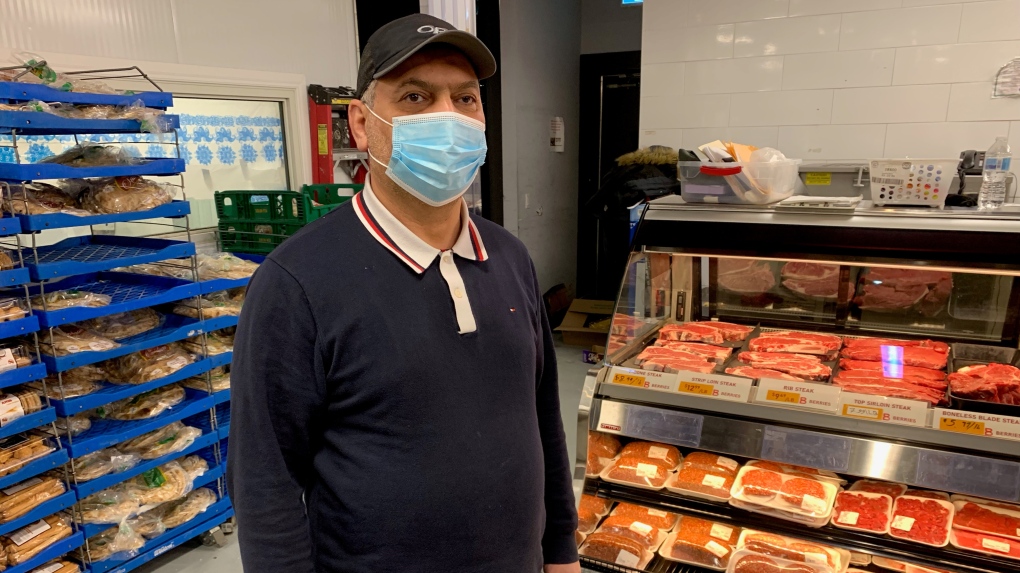Grocery cart economics hits home
Stretching a dollar and feeding your family — it’s something shoppers are finding harder to do these days.
“When I came to Canada in 2018 I can do groceries for just $100 in one month, and now it’s almost double,” said Prem Peep who just stocked up at his local No Frills in East London.
Brandy Shaw was out for her weekly shopping as well. She said she’s also seeing the upward trend in food prices and she’s none too pleased about it.
“Probably by 25 per cent I noticed, compared to this time last year,” said Shaw.
It’s not just shoppers with the bottom blues. At Berries Market in south London, CEO and President Husam Mohammad said he gets hit with bigger bills from suppliers, which he in turn has no choice but to pass along to consumers. CEO and President of Berries Market, Husam Mohammad, Jan. 25, 2022. (Bryan Bicknell / CTV News)“Which is unbelievable for the customer,” he said. He added that he understands their frustration. “Usually in the market there’s five per cent, 10 per. cent, but for time being sometimes 100 per cent.”
CEO and President of Berries Market, Husam Mohammad, Jan. 25, 2022. (Bryan Bicknell / CTV News)“Which is unbelievable for the customer,” he said. He added that he understands their frustration. “Usually in the market there’s five per cent, 10 per. cent, but for time being sometimes 100 per cent.”
And whether temporary or longer term, some items appear to be in short supply.
A quick tour through a major chain grocery store in London Tuesday revealed a number of nearly empty shelves — something most Ontario shoppers aren’t accustomed to seeing.
Mohammad said the problem is often worse for smaller grocers that don’t have the same buying power as their mega-sized competitors. He said many factors are at play.
“Lot of labour they don’t like to work at this time because of their health. Lines of production going down at a lot of factories. They have two, three lines, they have 50 per cent or less than that, even for Canadian factories too.”
At Brescia University College in London, professor Peggy O’Neil said while it may seem like it, the higher prices didn’t happen over night.
O’Neil, who teaches Food, Leadership and Social Change said the issues affecting food prices and availability have been simmering for some time. Dr. Peggy O'Neil speaks with CTV News London via Zoom, Jan. 25, 2022. (Bryan Bicknell / CTV News)
Dr. Peggy O'Neil speaks with CTV News London via Zoom, Jan. 25, 2022. (Bryan Bicknell / CTV News)
“Prices of feed were higher for farmers and we saw labour interruptions at processing facilities, as well as increase in wages.
”Further, O’Neil said what we may not always see in shopping cart economics is how food inflation affects those living on a lower income.
“If you’re struggling economically, it already adds another factor, so nutrition is an important factor when food prices do go up. You’ve got to look at food as an investment and not a transaction.”
Back at No Frills, shopper Brandy Shaw said to look for the deals.
“Try to get as many discounts as you can and build up your points and try to buy stuff on sale when you can because it’s going to affect everything.”
CTVNews.ca Top Stories

BREAKING King Charles' cancer treatment progressing well, says Buckingham Palace
King Charles III’s doctors are 'sufficiently pleased' with his cancer treatment and he is expected to return to public-facing duties, Buckingham Palace announced on Friday.
BREAKING Orca calf that was trapped in B.C. lagoon for weeks swims free
An orca whale calf that has been stranded in a B.C. lagoon for weeks after her pregnant mother died swam out on her own early Friday morning.
'Unacceptable': Trudeau reacts after AFN chief says headdress taken from plane cabin
After the Assembly of First Nations' national chief said her headdress was taken from an airplane cabin this week, Prime Minister Justin Trudeau called the incident 'unacceptable' and a 'mistake' on the part of Air Canada.
DEVELOPING Bird flu outbreaks: WHO weighs in on public health risk
The current overall public health risk posed by the H5N1 bird flu virus is low, the World Health Organization said on Friday, but urged countries to stay alert for cases of animal-to-human transmission.
Sophie Gregoire Trudeau on navigating post-political life, co-parenting and freedom
Sophie Gregoire Trudeau says there is 'still so much love' between her and Prime Minister Justin Trudeau, as they navigate their post-separation relationship co-parenting their three children.
Regina police officer injured after being accidentally shot by fellow officer's gun
An investigation is underway after a Regina police officer was accidentally shot by a fellow officer’s gun during the search of a house early Friday morning.
From faulty kids' cribs to flammable kids' bathrobes, here are the recalls of the week
Health Canada issued recalls for various items this week, including kids’ bathrobes, cribs and henna cones.
Taylor Swift dons Montreal designer's dress in 'Fortnight' video
A pair of Montreal designers' work has now been viewed over 41 million times. Taylor Swift dons a Victorian throwback black gown in her latest music video, 'Fortnight', designed by UNTTLD due Simon Belanger and Jose Manuel Saint-Jacques.
Island near Mull of Kintyre for sale for US$3.1 million
An idyllic 453-acre private island is up for sale off the west coast of Scotland and it comes with sandy beaches, puffins galore, seven houses, a pub, a helipad and a flock of black-faced sheep.





























